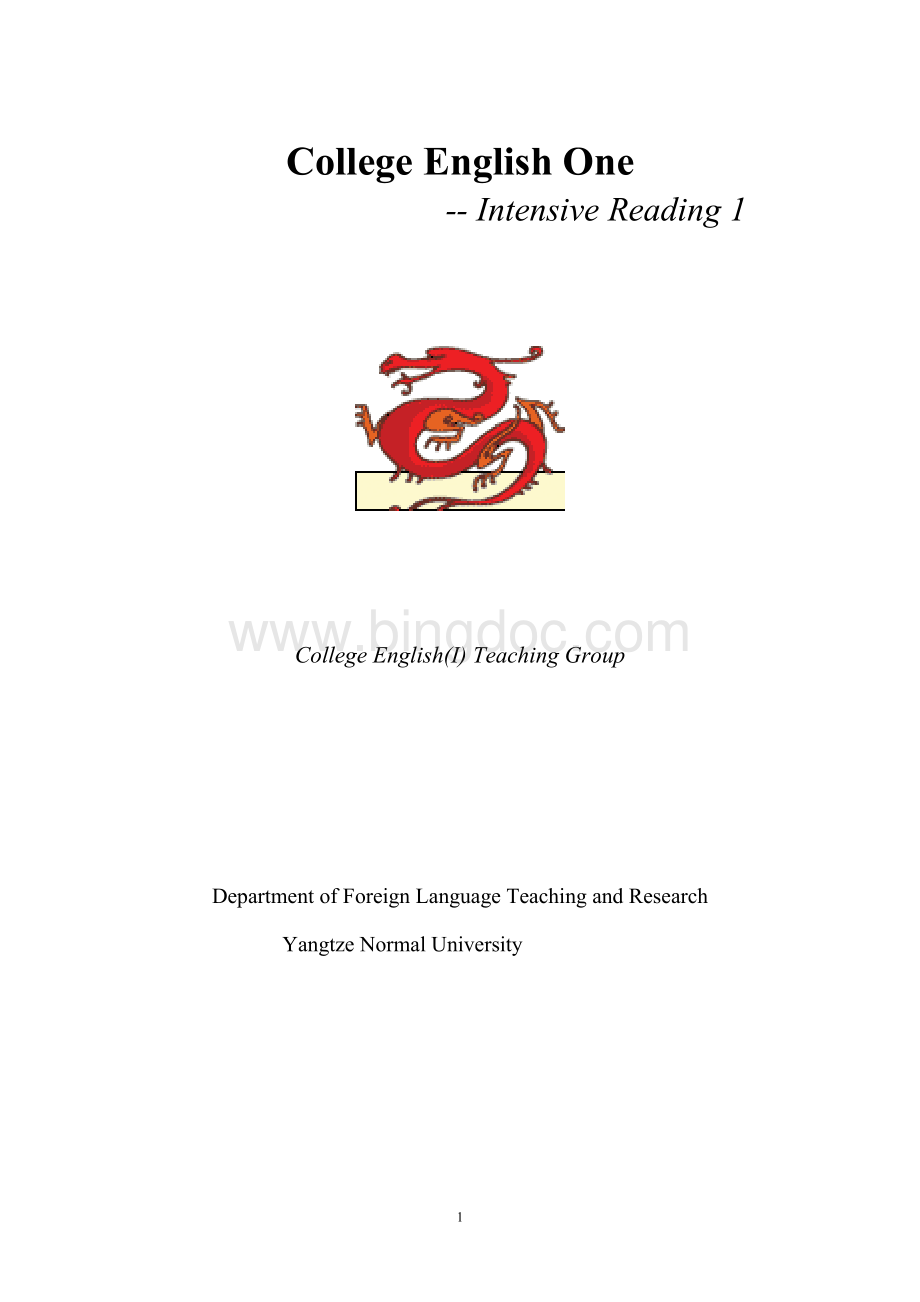董亚芬大学英语精读第1册Unit1教案.doc
《董亚芬大学英语精读第1册Unit1教案.doc》由会员分享,可在线阅读,更多相关《董亚芬大学英语精读第1册Unit1教案.doc(39页珍藏版)》请在冰点文库上搜索。

CollegeEnglishOne
--IntensiveReading1
CollegeEnglish(I)TeachingGroup
DepartmentofForeignLanguageTeachingandResearch
YangtzeNormalUniversity
Unit1SomeStrategiesforLearningEnglish
Intensivereading
Objectives:
1.Understandingthemainidea
2.Understandthestructure
3.Learnrelatedterms
4.Masterthekeylanguagepointsandgrammaticalstructuresinthetext.
5.Conductaseriesofspeakingandlisteningtaskbasedonthetext
Teachingfocus:
1.LearntounderstandthestrategiesforEnglishLeaning
2.Theunderstandingreadingskills
Pre-readingTasks
1.Warmingupactivities
Pairwork/groupwork:
studentsworkinpairsorgroupstodiscusstheiropinionsaboutthefollowingtopics.
1.WhendidyourstoryoflearningEnglishstartoff?
2.DoyouenjoylearningEnglish?
Why?
IenjoylearningEnglish,becauseIfinditveryinteresting.First,inmyopinion,Englishisabeautifullanguage,includingitspronunciationandshape.Ienjoyspeakingandlisteningtoit.
3.DoyouhaveanytroublelearningEnglish?
4.DoyouthinkitusefultolearnEnglishwiththehelpofsomestrategies?
5.WhatstrategiesdoyouthinkcanbeemployedinEnglishlearning?
6.WhatdoyouthinkisthemosteffectivewayoflearningEnglish?
AsfarasIamconcerned,seeingEnglishmoviesisthemosteffectivewayoflearningEnglish.IchoosethosemoviesthatIhavegreatinterestin,suchascartoons.Foreachmovie,Iwillseeatleastthreetimes—withoutsubtitles,withChineseonesandwithEnglishones.Andatthesametimespeakloudlyafterthecharacters.Thoughenjoyingmovies,ImakeconsiderableprogressinEnglish.
2.Informationrelatedtothetext.
EnglishasanInternationalLanguage
Worldwideover1.4billionpeopleliveincountrieswhereEnglishhasofficialstatus.Oneoutoffiveoftheworld’spopulationspeakssomeEnglish.Over70%oftheworld’sscientistsreadEnglish.About85%oftheworld’smailswritteninEnglish,and90%ofallinformationintheworld’selectronicretrievalsystemsisstoredinEnglish.
Languagelearningstrategies
Languagelearningstrategiesareusedbylearnerstocompletespeaking,reading,vocabulary,listeningandwritingactivitiespresentedinlanguagelessons.Recognizingthatthereisatasktocompleteoraproblemtosolve,languagelearnerswillusewhateverstrategiestheypossesstoattendthelanguage-learningactivity.
Possiblelanguagelearningstrategiesinclude:
usingpracticeopportunities,self-evaluation,selectiveattention,timemanagement,reviewingnotestakeninclassandcheckingone’sunderstanding,constantlyseekinganswerstoquestionsinsteadofpassivelyreceivinginformation,etc.
Activevocabularyandpassivevocabulary
Activevocabularyconsistofthewordsyouusefrequentlyandcomfortablyinspeakingandwriting,whilepassivevocabularyconsistsofthewordsyourecognizewhenyoureadandlisten.
Input-outputbalancetheoryinlanguagelearning
Inputinlanguagelearningreferstoinformationread,seenorheardbythelearner,whileoutputreferstowhatthelearnerproducesinwritingandspeaking.Theinput-outputbalancetheoryinlanguagelearningbelievesthatonecanlearnalanguagewellthroughmaintainingabalancebetweeninputandoutput.
EnglishisnotRealEnglish.
Skimmingandscanning
GlobalReading
1.Partsdivisionofthetext
PartⅠ(Paras.1-2)IntroducegloballythatwhilelearningEnglishisnoteasy,therearestillsomehelpfulstrategies.
PartⅡ(Paras.3-8)Introducesixhelpfulstrategiesindetail.
PartⅢ(Para.9)Concludethatlanguagelearningisaprocessofaccumulation.
2.Summary
LearningEnglishisnoteasy,buttherearestillsomeusefulstrategiesthatwecanusetomakeiteasier.Thetextintroducessixstrategiesconcerningvocabulary,idioms,listening,speaking,readingandwriting,andthesestrategiescoverthebasicandimportantpointsinEnglishlearning.Thetextalsotellsusthatlanguagelearningisaprocessofaccumulation.Itisworthwhileforustotakeinasmuchaswecanfromreadingandlisteningandthenputthemintopracticethroughspeakingandwriting.
3.Decidewhetherthefollowingstatementsaboutthetextaretrueorfalse.
1)Languagelearnersshouldmemorizeallthenewwords.(F)
Whileactivewordsdemandconstantpracticeandmemorization,wordsthatdonotoftenoccurineverydaysituationsrequirejustanoddingacquaintance.
2)It’simpossibletocramtoomanywordsintoyourheadatatime.(T)
3)hemeaningofawordandthewaynativespeakersuseitareequallyimportant.(T)
4)ListeningtoEnglishoccasionallywillimproveyourearandspeakingskills.(T)
5)It’simportanttocatcheverydetailinEnglishlisteningcomprehension.(F)
Thefirsttimeonemaynotcatchagreatdeal,butwitheachrepetitiononewillgetsomethingmore.
6)LanguagelearnersdonotfindmanyopportunitiestopracticeoralEnglishatschool.(T)
4.DiscourseAnalysis
Astrategyreferstoasetofcarefullyplannedmethodsforachievingsomethingthatisdifficultandmaytakealongtime.
Inintroducingsomestrategies,theauthoradoptsthestructureofProblem—StrategywithinaparagraphtoshowustheproblemsinEnglishlearningandthenproposesstrategiestosolvetheproblems.PleasescanthetextforsomeexamplesoftheProblem—Strategystructure.
problems
strategies
1.Itisimpossibletomemorizeallthenewwordsyouarelearning.
1.Dealwithactivevocabularyandpassivevocabularydifferently
2.Youdonnotknowtheidometicusageofsomewords.
2.Watchoutfornotonlythemeaningofawordbutalsothewayitisusedindailylife.
3.Youmaynotbeabletocatchalotafterlisteningtoapassageforthefirsttime.
3.Listentoitoverandoveragain.
4.TherearefewsituationsforyoutopracticespeakingEnglishatschool.
4.SeizeeveryoppotunitytospeakEnglishwithorwithoutapartner.
5.WhatstrategiesdoyouthinkcanbeemployedinEnglishlearning?
SuggestedStrategies:
Makeyourownoppotunitiesforpracticeinusingthelanguageinsideandoutsidetheclassroom.
Specificways:
1)askyourteacherquestionsbefore,duringandafterclass.
2)speaktoaforeigner
3)listentoanEnglishradioprogram.
4)watchanEnglishmovie.
5)readanEnglisharticleontheInternet.
6)useEnglishsoftware.
While-readingTasks
TextLearning
1.Explaintheskillofskimmingandscanning
2.Askstudenttoskimthetexttohaveageneralideaaboutthetext.
3.Underlinethedifficultwordsandsentencesandanswerthequestionsonpage7
4.Expalinthetext
5.Askstudentstosumupthegoodhabitmentionedinthetextandlearnthembyheartintheclass.
6.Languagepointsandstructure
Newwordsandexpressions
1.strategy:
n.theactofplanningandmanagingoperationsoveralongperiod.
Example:
It’salongwayforourgovernmenttodevelopastrategyfordealingwithunemployment.
★tactic:
n.战术tactical:
adj.战术的
strategy:
n.战略strategic:
adj.战略的
Ourstrategyis“topitoneagainstten”,whileourtacticis“topittenagainstone”.我们的战略是“以一当十”,我们的战术是“以十当一”。
2.means:
n.(ofsth/doingsth)wayofdoingorachievingsth
byallmeans:
usedtosaythatyouareverywillforsbtodosth
Example:
“DoyoumindifIhavealook?
”“Byallmeans.”
bynomeans/notbyanymeans:
notatall
Example:
Sheisbynomeansaninexperiencedteacher.
3.diligent,hard-working,industrious
①diligent侧重于对从事的工作十分热爱,肯钻研。
主要用于埋头从事某项工作,研究或调查等脑力劳动,只能形容人。
②hard-working常在口语中代替diligent.
③Industrious常用于文章中,通常指在工作中不浪费时间,可用于人,也可用于蚂蚁,蜜蜂等动物。
4.prolong:
vt.【pro-(forword向前)+long】makesthlastlonger
Example:
Theoperationcouldprolonghislifebytwoorthreeyears.
prolong/lengthen
①延长:
prolong(时间的延长)/lengthen(时间或空间的延长)
②(时间)延长:
prolong(人为的延长)/lengthen(自然的延长)
Example:
Somepeoplehavetriedtofindameansofprolonginglife.
Thedaysbegintolengtheninspring.
5.sustain:
vt.【sus-(=sub:
under)+tain(support,支撑)】support;maintain;endure
Example:
Hopesustainhiminhismisery.在不幸中是希望在支撑着他。
Thevillagersalongtheseacoastaresustainedbyfishingtrade.沿海的村民靠渔业为生。
6.complain:
v.saythatyouareannoyed,notsatisfied,orunhappyaboutsthorsb.
①complainof(doing)sth:
抱怨做某事
②complainthat…:
抱怨Thetouristscomplainedthattheroomsweretoodirty.
③complaintosbof/aboutsth:
因为某事抱怨某人
◆Intheracetoimproveeducationalstandards,schoolsarethrowingthebooksatkids.Evenelementaryschoolstudentsarecomplainingofhomeworkduty.(CET-4,2003,12,阅读)在提高教育水平的竞争中,学校将书本抛给了孩子。
即使是小学生也在抱怨作业任务重。
7.cram:
vt.makesthtofull
Example:
Hecrammedeightpeopleintohiscar.(把……塞满)
Heisbeencrammingforhisexamsallweek.(为应考临时死记硬背)
8.Bound:
adj.
beboundtodo一定,必定
Example:
Don’tlietoher,sheisboundtofindoutallaboutit.
beboundfor/to准备前往,在前往……的途中
Example:
ShewasonaplaneboundforShanghai.
knownobounds不知限量,无限
Example:
Itseemsthathisdesireforpolitivalpowerknowsnobounds.他对政治权力的欲望似乎是无止境的。
9.constant:
adj.
constancy:
n.
1)happeningregularlyorallthetime
Example:
Therewasaconstantstreamofvisitorstothehouse.她的诊室不断有家长前来求助。
2)stayingthesame
Example:
Thetruckwastravellingatafairlyconstantspeed.
3)loyalandfaithful
Example:
Heisaconstantfriend.
10.commit:
vt.
①将……托付给
②犯(错误罪行等)
◆Thedefenselawyerwasquestioningtheoldmanwhowasoneofthewitnessesofthemurdercommitedlastnight.(CET4,2005,12,词汇)辩护律师在询问那位老人,他是上个月谋杀案的目击者之一。
Collocation:
commitacrime/error/犯罪/犯错/犯谋杀罪/犯纵火罪/自杀
murder/arson/suicide
commit(sb.)todoing(sth.)向某人承诺做某事
commitoneselfto(sth.)致力于
commit(sb./sth.)to(sth.)为某一特定目的而使用人力或物力
c